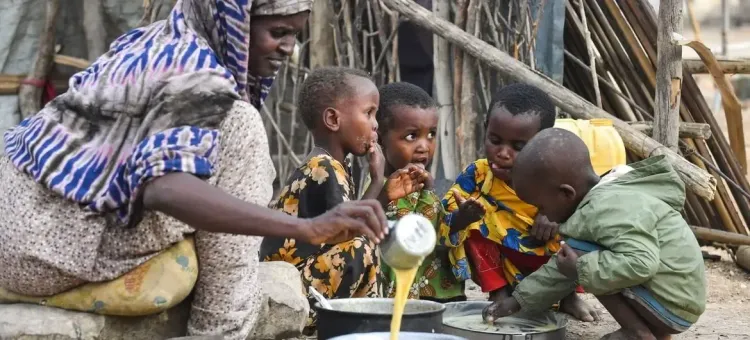WFP Seeks Almost $300 Million for Humanitarian Aid in Somalia

Synopsis
Key Takeaways
- The WFP requires $297 million to continue operations in Somalia.
- 3.4 million people are currently facing crisis-level hunger.
- Projected rise to 4.4 million due to drought and conflict.
- 1.7 million children at risk of acute malnutrition.
- Funding cuts will limit food and cash assistance.
Mogadishu, March 5 (NationPress) The United Nations World Food Programme (WFP) announced a significant funding shortfall of $297 million to address humanitarian needs in Somalia over the next six months.
It warned that without additional funding, the WFP's essential operations in Somalia will experience pipeline interruptions by mid-year.
"Timely intervention is crucial to prevent a humanitarian crisis in Somalia," stated WFP Director of Food Security and Nutrition Analysis Jean-Martin Bauer.
Increased funding is critically needed to enhance food assistance, nutritional support, water and sanitation services, as well as initiatives to promote livelihoods in light of an anticipated drought in Somalia, Bauer emphasized.
The announcement follows alarming data indicating that an additional one million individuals could face crisis-level food insecurity in the upcoming months due to drought, conflict, and soaring food prices jeopardizing agricultural production, limiting market access, and escalating humanitarian requirements.
The latest Integrated Food Security Phase Classification (IPC) report, released last week, reveals that 3.4 million people are already enduring crisis-level hunger or worse.
This figure is expected to climb to 4.4 million, which is nearly a quarter of Somalia's population, between April and June, coinciding with forecasts of below-average rainfall that could lead to drought conditions, according to Xinhua news agency.
Bauer cautioned that without immediate funding, Somalia risks slipping back into severe hunger.
By late 2022, Somalia was on the verge of famine due to the longest drought in recorded history, with successive failed rainy seasons wreaking havoc on the country, according to the WFP.
"A substantial scale-up of humanitarian assistance from the WFP and partners prevented famine in late 2022. However, hunger is rising again as another drought approaches," the statement noted.
IPC findings indicate that approximately 1.7 million children under five years old are projected to confront acute malnutrition through December in Somalia.
Of these, 466,000 are at risk of severe acute malnutrition, with nearly two-thirds of the malnutrition burden concentrated in southern Somalia, which is grappling with the most severe drought conditions and insecurity.
"As humanitarian demands grow, insufficient funding leads to the reduction or complete elimination of life-saving programs," the WFP stated.
The organization highlighted that starting in April, it will provide food and cash assistance to 820,000 vulnerable individuals monthly, drastically reduced from 2.2 million per month in 2024.









